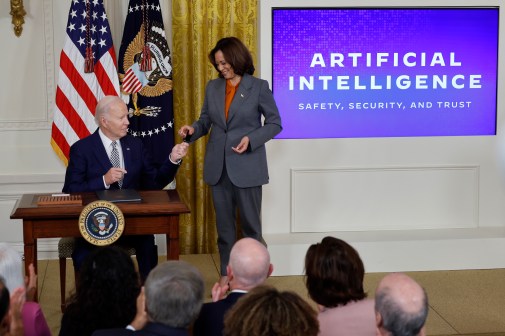Employees lack clear confidant for discussing data removal, former official says

At a time when some worry that federal scientific data will be removed from government websites, a former Obama-era Commerce Department official said Saturday he didn’t know of a clear path for career officials to alert people to those problems.
It is “going to be important” for career employees to have an avenue for talking freely with someone they trust if they are pressured to remove government content, Mike Kruger said at an event Saturday at Georgetown University focused on archiving federal environmental and climate data.
Kruger — who left Commerce in October after about six years of service, most recently as deputy director of public affairs — went through the scenario of what department employees were to do if pressured to take information offline.
“If someone had told me, or some of the folks in my digital office, ‘this has to come offline’ we had a pretty high bar internally,” Kruger said, but noted, “that ultimately if like the deputy secretary, who is the [Chief Operating Officer] of the organization said you got to take it off, we kind of only have one point of contact which is our FOIA officer.”
He also said he thought there would need to be a Federal Register notice on the choice to remove the data, but “you know those get buried on purpose all the time.”
“The interesting thing is internally, if I had been a career [government employee] and I had been under pressure to take something offline, I wouldn’t have known, besides the FOIA officer, where my escape valve is,” he said.
The Department of Commerce did not respond to requests for comment.
Fears about the preservation of federal scientific data has been fueled by reports of agency gag orders and activists’ seeing government pages change after inauguration. In one concrete example of data removal, the Agriculture Department’s Animal Plant and Health Inspection Service actually removed in February from the public eye certain animal welfare reports. APHIS has started putting some of that back online, but said it “will continue to review records and determine which information is appropriate for reposting.”
The event at Georgetown — attended by coders, librarians, scientists, storytellers and others passionate about data — included a teach-in on the importance of federal data and a roundtable discussion on vulnerable government data, of which Kruger was a participant. At a similar event this weekend in Haverford, Pennsylvania, participants worked to flag important URLs for the National Oceanic and Atmospheric Administration, which is under the Department of Commerce.
Kruger said he wasn’t sure if speaking up about data removal would rise to the level of whistleblowing. But it would maybe be good, he said, to have a way for employees to anonymously say what has been taken down, in the event that data or web pages were removed.
“If you lose something, you say something,” he joked.






